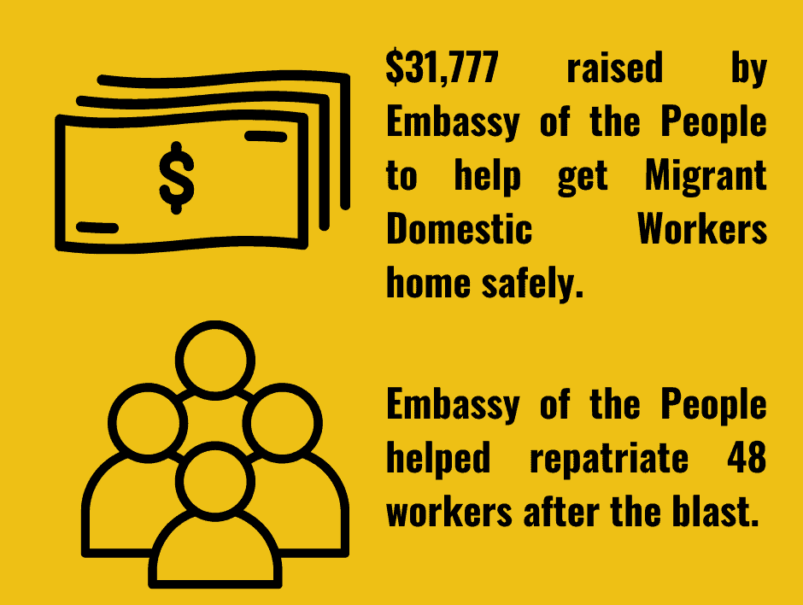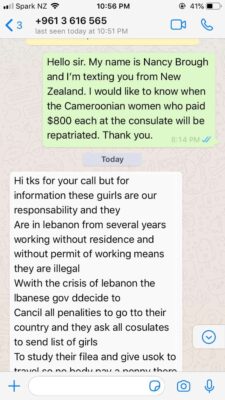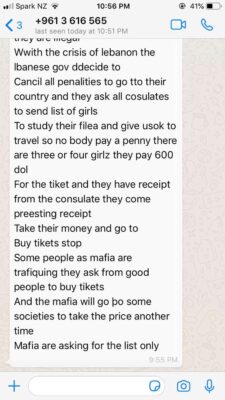THE BRIEFING
| |
Due to the devastating explosion that took place in Beirut on Aug. 4th 2020 in the midst of an economic crisis, and a worldwide pandemic; thousands of Domestic Workers were left on the streets with no end in sight. An initiative to assist Migrant Domestic Workers was set up in response: The Embassy of the People.
To unite in this time of crisis, Embassy of the People teamed up with local artists in Kuwait and uniquely, took action in the most practical way possible given the circumstances. By hosting a live-stream musical performance online, they collaborated with artists to help raise funds in order to get as many Migrant Domestic Workers back home to their families as possible.
The performance helped raise $31,777, enough funds to send 48 people back home to their loved ones in Sri-Lanka, Nigeria, Togo, and Sierra Leone.
We spoke to Zaina Ammouneh from Embassy of the People to gain an insight into what spurred this team into action, read the full story below

What was your role in helping set the fundraising up?
As long as I helped, that is all that matters. The rest is just irrelevant details. The outcome is 48 people went home.Generally speaking though, Embassy of the People is a platform created by a group of like minded individuals that want to give people the opportunity of lending a hand where needed. No affiliations, no official organizations and no commitment to one cause. We are just people, helping people – which makes us huge believers and advocates of empathy in its most basic form. Regardless of all political, racial or religious affiliations, at the end of the day, we are all simply humans. This event is just the first of a series of many other opportunities for people to positively impact other humans’ lives.
Was there just artists from Kuwait or from different countries?
All artists are residents of Kuwait.
How many people signed up to the livestream and tuned in?
We had approximately 1000 viewers.
What motivated you to set up the event?
We knew people wanted to help and didn’t know who to trust with their donations. We also understood people were overwhelmed with all the uncertainty going on whether due to the pandemic, or the unfortunate and tragic occurrence in Beirut. The thing with giving is that it does not always have to be linked to dire circumstances and immediate relief; we believe it should be a way of life, affiliated with positive experiences. Generally, when people donate, it’s driven by heartbreak. With EOTP, we adopt different social, whether local or worldwide causes that allow people a platform to give, and give happily. What if people can associate giving to a feel good experience? What if we can all lead by example, in our daily decisions and actions? What if it is doesn’t have to be, “I have to” but “I want to”. What if each and every one of us is proactive and responsible for their own little corner? We have faith in people, and each persons’ individual power. And we believe in the change that can bring.
What was it that motivated you to choose to raise money for migrant workers in particular?
We thought of various different causes. We had input from friends in Lebanon that this particular cause was time sensitive and was not getting enough attention. One of our main concerns was safely getting the money to the right people and making sure it was used properly. As travel was restricted, we couldn’t personally be there to see distribution. Various great organizations and individuals were already on immediately relieving Lebanese people, so we felt that cause was getting a lot of attention. At the end of the day, it does not really matter who you help, as long as you are positively impacting another human’s life.
If you had a message to send to people about the situation of migrant workers in Lebanon and across the region, what would it be?
Regardless of any countries specific laws regarding domestic workers – these things are out of our control and this is not our dialogue. Focus on what you as a human being can control – our personal behavior and moral compass. What do you stand by and how would you like to be treated? Understand the crucial role you play in life; understand the individual power you have and multiply that with 8 billion and you get the collective power. Learned behavior, is just that – learned behavior. The way things are done, is in essence, established previously – a thing of the past. Complaining is easy, blaming is easier. But what are you taking responsibility for?
THE BRIEFING
| |
The Cameroonian consulate of Lebanon is blocking the process of repatriation for Cameroonian women stranded in Lebanon. Cindy, President of Cameroonian Community in Lebanon and @Help_Them_Home are asking you to join the fight with the Cameroonian women so that they can GO HOME. More details below.
On the 16th of August 2020, Cameroonian women stranded in Lebanon began protesting at the Cameroonian Consulate of Lebanon. They have been waiting over six months to be repatriated back to the Cameroons.
Honorary Consul, Jean Abboud has taken over $800 USD from each woman to process their Emergency Travel Certificate, because their employers illegally confiscated their passports (as over 94% of employers do). However, he has provided the workers no information about when they will be able to escape one of the world’s worst economic crises to go home. Cindy, President of Cameroonian Community in Lebanon, and @Help_Them_home have inquired about purchasing their tickets, but Jean Abboud and his staff refuse to lift a finger for them to have the necessary paperwork in order that they might evacuate back to their homes and families.
Jean Abboud has served as Honorary Consul for 22 years. He is a Lebanese national and the Cameroon’s only diplomatic representation for their citizens in Lebanon. He leverages his position to operate a travel agency as if it were an extension of the consulate. Furthermore, he works closely with people who own the recruiting agencies (slave traders), which is not without financial benefits. After @Help_Them_Home published the initial report on this incident, a woman from New Zealand contacted This Is Lebanon with a record of Honorary Consul Abboud’s reply to her inquiry into the matter.
His reply was unclear as to why the workers are not able to get their documents to go home. Abboud seems to suggest that the problem is that they “are illegal.” However, he does assert that it is “our [Honorary Consulate’s] responsibility” and other people should not get involved, but failed to offer a clear answer as to how the Honorary Consulate is going to take care of their responsibility. He ends his rant with stating, “some people as mafia are trafiquing they ask from good people to buy tikets. And the mafia will go bo some socieities to take the price another time.” Although there have been many Cameroonian workers, activists and organizations inquired about the list, Abboud claimed that the “Mafia are asking for the list only.”
Honorary Consul Jean Abboud is assisted by his secretary, Georgette Chidiac (Joujou Chidiac). However, she has also refused to help, and is known to treat the Cameroonian nationals poorly. The workers report that:
- “She rejects us as if we were objects. She doesn’t think about us. Because we’re African, we have to stay outside. It’s NOT nice.”
- “When we call her, she doesn’t give a shit, she insults us, she doesn’t give a shit.”
- “Our [secretary] Consulate, she must leave that office, because she doesn’t care about us. How many months?!”
- “When we come to see her, she doesn’t treat us with basic courtesy.”
- “She’s got to get out of that office. She’s got to get out and we’ll put in someone who can help us. That’s all we want”
After the Cameroonian women witnessed that the Kenyans were able to successfully fight to get support from General Security when their consulate failed them, they approached General Security directly. General Security agreed to help the Cameroonian women but requested they provide them with the full list of names of the Cameroonian women who need the Emergency Travel Certificates from the consulate. The Honorary Consul refused. The same General Security that returns women back to their abusers is more willing to help these workers than their own consulate. The Honorary Consul refused the offer, but insisted that they would have their papers and travel certificates by morning-time on Monday, September 21, 2020. When they arrived to the Consul on Monday morning, the Consul was closed and they were not even allowed inside. Their protest continues, and they are asking for you to share their message so that they can go HOME!
UPDATE: October 1, 2020
After weeks of protests in front of the Cameroonian Honorary Consulate in Beirut, the workers have FINALLY received their laissez passer so that they can purchase their tickets and fly home. Cindy and @Help_Them_Home have raised the funds so that all 29 Cameroonian workers can go home by the end of the money.
UPDATE: October 23, 2020
All twenty-nine of the Cameroonians flew from Beirut International Airport to Douala International Airport and at approximately 2:00pm October 23rd. Immediately, they were arrested by the Cameroonian Police. At the time of writing this post, ALL twenty-nine women have been detained for the last 9 hours. They have not been given ANY indication or reason why. Their only suspicion is that Jean Abboud has arranged for their arrest in retaliation for their organized protests against his negligence and malfeasance.
Please help petition for their release. TAKE ACTION below.
TAKE ACTION
They can’t do this alone. They need your help! Join the fight.
Contact Jean Abboud
Talk to the Jean on WhatsApp and ask him why the workers were DETAINED ON ARRIVAL?!
Contact Jean Abboud
- Send him a WhatsApp at +961 3 616 565
- Call his office at +961 4 540 400 or +961 4 540 300 or +961 4 540 200
- Give him a visit at the Cameroonian Consulate at Metn, Dbayeh, Gemma Center, 9th Floor, Beirut, Lebanon
- Email him at: [email protected]
Update the Foreign Ministry
Post an update on Cameroon’s Foreign Ministry’s page to let them know what is happening. Send an email to [email protected] and petition for these 29 women’s release.
Talk to Georgette Chidiac
Send Georgette Chidiac a message on WhatsApp or give her Facebook a visit. See if she is interested in using her channels to help get the workers released.
Contact Georgette Chidiac
- Send her a WhatsApp at +961 3 493 692
- Follow her on Instagram at: instagram.com/joujouchidiac/
- Encourage her on Facebook: facebook.com/georgette.chidiac/
Share the Update
Tell others about this. Bring others in the fight to ensure that Georgette Chidiac and Jean Abboud do their jobs!
THE BRIEFING
| |
#SendUsHome Update for Kenyans in #Lebanon: We are thrilled to announce that we’re purchasing 33 tickets for Kenyans who are ready to go HOME! If you’ve been following us, this might seem like the next logical step, while also confusing why we didn’t do this a few days ago. Ultimately, the Kenyans fought hard not only for themselves but also for all migrant domestic workers in Lebanon. As we addressed the situation, we were looking at the big picture and failed to treat those heroes with fairness and equity. For that, we are sorry.
The Kenyan women’s struggle was not only their struggle but one that resonated with every domestic worker in Lebanon. We’re incredibly grateful for these strong women. They were faced with many trials as they took the struggle to the streets, but they stayed strong at every stage. In the end, many of them felt abandoned by This Is Lebanon. For that, we are very regretful. When it is all said and done, we follow our promises by both the letter and the spirit. The spirit of our commitment to pay for the 14 mothers with their 16 children and 3 pregnant women says that even though we didn’t have an opportunity to pay for their specific tickets, we said we’d pay for 33 Kenyan tickets. So we will pay for 33 Kenyan tickets! Why did we say otherwise a few days ago? We’ve put our explanation below.
Kafala in Lebanon is a massive system with over 500,000s workers in Lebanon. An enormous number of these workers are already on the streets, even more want to leave, and every day this becomes true for more and more workers. When we launched our campaign to #SendUsHome, we aimed to evacuate those in most dire need of getting home. Also, we want to most strategically use the funds to repatriate the workers who don’t have hope of otherwise getting home in a way that increases the pressure on sending countries to repatriating their workers instead of alleviating it.
It is an incredibly complex task to manage these factors. For instance, we learned that Kenyan Ministry of Labour requires the recruitment agencies to pay an insurance bond every year. This insurance fund is set up so that if there’s an emergency situation, the Kenyan Ministry of Labour is supposed to use that insurance money to repatriate their workers (and even pay for lost wages). We heard from a second-hand source that the government is in the process of making this happen. We weren’t sure about it but thought it was worth putting pressure on the government instead of alleviating pressure.
Last week, we heard that those 33 women we initially committed to repatriating got their exit passports (with one exception). Still, at the same time, their tickets were purchased, and we were never given an opportunity to buy them. We thought this great news because we felt confident the rest of the Kenyans would be repatriated by existing efforts. We knew of many communities that had less of a spotlight that would need the funds. For instance, did you even know there are women from the Ivory Coast in Lebanon? We know we don’t have the ability to launch a French advocacy campaign to bring pressure on the Ivory Coast to repatriate their workers, so they are much more likely to require private funds to get home. However, we do have the ability to form a coalition to help the Kenyans return.
Furthermore, we are uniquely placed in the battle against Kafala in Lebanon. Our focus has always been workers who are trapped with their employers. We are completely reshaping our operations to address the new situation in a new way of getting those workers out. While it seems obvious that those out on the street have it the worst, the very worst is those actively enslaved by Kafala employers. The owners/employers can choose to feed or not feed their workers. They often make them work 100+ hours per week and humiliate and denigrate them in the process. Kafala owners have the choice of whether their workers can work in peace, or they can physically or sexually assault them with complete impunity. It takes an incredible amount of work to negotiate their release, but we see that as one of the direst needs. It was the stories of these workers that we originally posted. A recent one said, “If I don’t get any help or my money I am going to kill myself.” This is everyday stuff. This Is Lebanon.
However, we missed one important piece. We told the Kenyans that we’d buy 33 tickets for their stranded workers. It doesn’t matter what master-plan we come up with. It doesn’t matter that we didn’t have an opportunity to actually pay for the specific 33 tickets that we first mentioned. We broke trust when we said we were going to allocate those funds to other tickets. We’ve been in contact with the Kenyan community in Lebanon. They communicated that this is how they felt about our decision. It became clear that it was the wrong decision. Before the master plan for abolishing Kafala, we must first prioritize our relationships with the workers who trust us to fight alongside them in their struggle to survive in this perilous place.
We have over 35 years of fighting Kafala in Lebanon on our team. We created This Is Lebanon at the beginning of 2017. Every day since we’ve begun, the nights have become shorter and shorter as we stay up to try to respond to the worsening situation. We’re fighting to abolish Kafala as hard as we can. We make mistakes along the way, but we learn and grow stronger. If you still feel hesitant to support us. No worries 😉 This is a long-term problem. We’ve been around a while, but we’ll be around a lot longer. Follow our pages. We’re accountable to you! Keep asking questions. We only ask one thing of you. Don’t look away. This humanitarian disaster of the Kafala system in Lebanon is only getting worse. Keep your eye on Kafala. Keep yelling about it. Keep screaming about it. Join the fight somewhere. Doesn’t have to be with us, but you need to be part of the change. Don’t look away.
P.S. We just purchased a couple of tickets for Nigerians. We’re finally getting together everything to put this plan into action! Stay tuned for more details!



